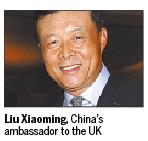Li's Britain journey 'to help build trust'
Updated: 2014-06-16 01:33
By Zhang Chunyan in London (China Daily)
|
|||||||||||
Business delegation to accompany premier; billions in deals likely
Deals worth more than $30 billion are likely to be signed during Premier Li Keqiang's visit to Britain this week, highlighting growing ties between the two nations.
"More than 40 agreements are expected between the governments and businesses covering a wide variety of sectors including energy, investment, cultural and educational cooperation," said Liu Xiaoming, China's ambassador to the UK.
Two hundred-plus Chinese business leaders will join the delegation.
Infrastructure, high-speed rail, nuclear and finance deals, as well as London's role as an offshore yuan trading hub, will be key topics during the visit.
Li, who leaves Beijing on Monday, will meet Queen Elizabeth II and have five hours of talks with British Prime Minister David Cameron. Li and his wife will also meet on a personal level with Cameron and his wife.
Li will witness the signing of agreements and attend the China-UK Global Economic Round-Table.
"I believe all these arrangements will help build trust and consolidate close working and personal relations at the highest level," Liu said.
Li will give a speech to top British think tanks and address a business gala and the China-UK Financial Forum.
Britain is China's second-largest trading partner in the European Union and a major destination for China's overseas investment.
Two-way trade hit $70 billion last year. Chinese investment in the UK has made huge progress. In the past two years, Chinese companies invested over $13 billion in the UK, outdoing their total UK investment of the previous three decades.
China-UK relations became strained in 2012 after Cameron met with the Dalai Lama, but they warmed after the British prime minister visited China late last year to scout for investment to boost the cash-strapped British economy.
The tensions flared again in April when China was listed as "a country of concern" in a "so-called human rights report" by the British Foreign Office.
"We think this report was biased against China," Liu said. It "missed the big picture. ... I don't think pointing fingers is a good way to enhance mutual understanding.
"Before I came here, we used to say when we talked about Europe it's Britain, France and Germany," Liu said.
"But, unfortunately, many opportunities were missed in the past year or so, so now it has become Germany, France and Britain."
Britain's visa reforms are also to be announced on Monday to encourage investors and other visitors from China. Liu said, "I receive complaints from businesses here. They have difficulties (rotating) their senior executives because of visa restrictions."
"I think visa issues really erode British power to attract more foreign businesses, talented people," Liu said.
More than 1 million visits are made each year between the UK and China. About 130,000 Chinese students attend school in the UK, making them the largest overseas student community in Britain.
"Both countries have a good shared history and know each other well, and I think that the status of the UK in China is good," said Kerry Brown, professor of Chinese politics and director of the China Studies Centre at the University of Sydney in Australia.
Brown was previously head of the Asia program at the Chatham House think tank in London.
Shi Yinhong, a professor of international studies at Renmin University of China in Beijing, said, "The foundation of China-UK relations is good." Mutual respect and attention to each other's major concerns are the basis for maintaining political trust and developing bilateral relations, he said.
"The two countries can develop stable, win-win relations if the UK does not touch China's sensitive issues and core interests like sovereignty and territorial issues," he said.
Brown said the areas in which China and the UK now cooperate are in the UK finance market and the educational sector.
"Creative industries will be more important and the UK can be a technological partner. So I think the UK will be able to promote itself as an important global player to China," Brown said.
Philipp Neumann contributed to this story.
Related Stories
Railways, nuclear power on agenda of Li's European visit 2014-06-13 03:51
Premier Li's Europe trip to deepen win-win cooperation 2014-06-12 15:41
Li eyes closer economic ties on Europe trip 2014-06-11 07:51
Li wants more local action to boost economic growth 2014-06-07 03:24
Today's Top News
Prime London properties lure investors
FIFA bans Suarez for 4 months
Tycoon criticized for charity in NY
50 trapped Chinese back to Baghdad
Northern Iraqis flee their home, avoiding Sunni millitans
DPRK test-fires newly developed missiles
RIMPAC drill not window-dressing for China-US ties
Li puts China-UK ties on new level
Hot Topics
Lunar probe , China growth forecasts, Emission rules get tougher, China seen through 'colored lens', International board,
Editor's Picks

|

|

|

|

|

|






